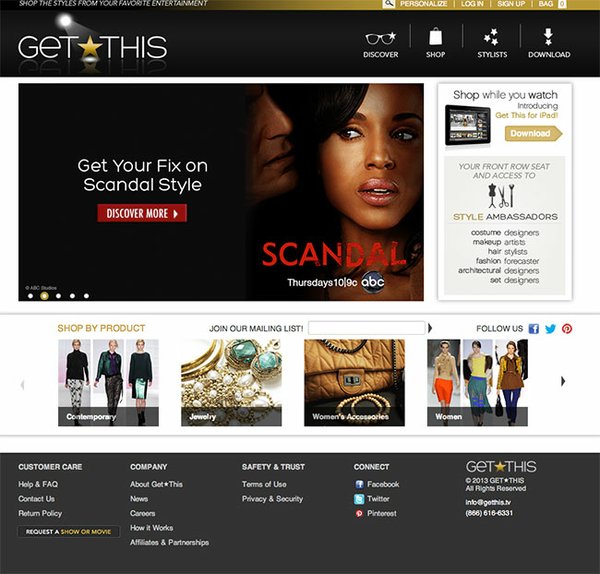TECHNOLOGY
Get This App Seeks to Break TV Retail Out of Test Pattern
Los Angeles–based company Get This Corp. wants to push television’s possibilities for fashion retail into a new prime time.
On April 18, the company introduced its first product, an iPad app, which will allow television viewers to purchase fashions worn by actors on a specific show as the program is broadcast.
With the “Get This” app, viewers of ABC political thriller “Scandal” will be able to purchase the iconic Gaspar-brand opera gloves worn by lead character Olivia Pope, played by Kerry Washington, as she stylishly puts out fires and caresses the egos of Washington, D.C., power brokers. Get This founder Lisa Farris made deals with 75 brands and “Scandal,” as well asCW Network shows “The Vampire Diaries” and “The Carrie Diaries,” to work with Get This. Deals with more shows will be announced in the future, Farris said. Get This consumers also can order goods from past episodes. If consumers cannot afford items displayed on a show, Get This stylists will recommend affordable alternatives.
Viewers shop Get This when they select a Shop In-Sync button from the company’s iPad app. (An iPhone app will be introduced in the future.) The Shop In-Sync button tracks show dialogue playing on the TV. By following show dialogue, the Shop In-Sync button can track what characters are wearing in specific scenes. If a viewer wants to buy a certain dress or piece of jewelry, they hit the app’s Get This button. The item is placed in the viewer’s e-shopping cart, and Get This acts as the merchant of record and takes the viewer’s credit card.
Get This then notifies the brand that one of its products has been offered, and the brand ships the item directly to the new customer. Items are sold for full price unless they are marked as “for sale.” Get This makes money by maintaining a super-affiliate fee, or a percentage of the sale. Get This is funded by angel investors, many of whom advise the company.
Fashion retail and TV have a long history. West Chester, Penn.–based QVC Inc. helped pioneer buying fashion direct from a TV show when it started in 1986. Then, QVC audiences ordered items by telephone as QVC hosts chatted up products from the broadcast retailer’s studios. Currently, QVC viewers also can place orders through computers and mobile devices. NBCshow “Fashion Star” hosts a reality competition where show contestants can win the prize of selling their creations at high-profile retailers such as Saks Fifth Avenue, Macy’s and Express.
Entrepreneurs have been prospecting this TV market for decades, Farris said. But past marketing studies noted that TV viewers wanted to devote their screens entirely to programs. They did not want a ticker tape of sales information playing underneath their programs. Ordering products on TV remotes also was deemed by marketing studies to be too complex.
But mobile devices offered new possibilities for TV retail. Audiences typically watch TV while sending texts and surfing the Internet on mobile devices. If audiences were confused by too many buttons on a remote, the multi-screen world of mobile devices seemed like second nature to them. “Essentially, tablets are the new remote control,” Farris said. “You don’t have to teach people to use them.”
Get This is not the only company pitching a service where consumers can purchase, in real time, items placed on TV shows. Another company, Seen On, also offers a real-time TV retail service, but it operates more like a flash-sale site, offering products for a limited time.
The TV retail venture has been tested recently. In 2011, CBS Consumer Products and Bebe Stores Inc. developed a venture where viewers of CW Network program “Beverly Hills 90210” could purchase Bebe fashions worn by the “90210” actors.
The partnership produced three collections that were sold over the program’s third and fourth seasons. The venture was intended to last for a limited time only, and viewers were notified, with an ad aired on the show, that Bebe clothes were for sale. Purchases can be made on e-commerce sites for Bebe and the CW Network.
Erica Zohar of consulting company American Groove, and, now, Internet T-shirt company Teeology, put together the deal between Bebe and CBS Consumer Products. She said the market is still maturing for companies developing retail with television.
First, viewers need to be notified that their favorite show also will offer shopping opportunities. Otherwise they might not be aware of the show’s merchandising and sales, Zohar said.
It also demands diplomacy and time to broker agreements with retailers and the bureaucracy of television producers, entertainment distributors and other executives guiding programs to broadcast.
“What we did was really challenging,” Zohar said. “To actually sell what characters are wearing on TV in real time is difficult. It is possible.” Stay tuned.






















